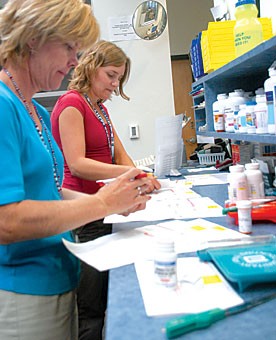Staying healthy isn’t usually one of students’ biggest concerns when they first come to campus, but if a student wants to maintain a high grade point average along with an active social life, it is essential that they get plenty of rest, eat a balanced diet and exercise regularly, said a nurse practitioner from the UA’s Campus Health Service.
But, of course, if they are still in need of health care while at the university, students can visit Campus Health to access resources like the urgent care facility, a counseling program and an on-site pharmacy, said Terri West, the administrative associate for the Campus Health administration office.
“”Whenever I am sick, I would go there because the services are cheaper and convenient because they are on campus,”” said Alana Thomas, a molecular and cellular biology senior.
Stress-related illnesses are one of the most common problems seen at Campus Health, but students can easily prevent these problems from happening to themselves, said Lisette LeCorgne, coordinator of urgent care at Campus Health.
LeCorgne said most stress-related problems come in the form of stomach aches due to increased acid production in the stomach, which students can avoid by staying away from caffeine, nicotine, alcohol and chocolate during busy times of the school year.
If stomach pains persist, LeCorgne said students can go to urgent care to get a prescription to alleviate these or other problems that can be filled at the on-site pharmacy in Campus Health.
The pharmacy offers over-the-counter medication and antibiotics, as well as many forms of birth control, to students at about half the price of retail, said Beckie Moreno, Campus Health’s chief pharmacist.
Any prescription will be honored and filled at Campus Health as long as it is legally acceptable, Moreno said.
Adam Schuman, a political science junior, said it is great for students to have a pharmacy so conveniently located, especially if they don’t have a car.
If students are still experiencing stress or other problems where they are in need of counseling, they can visit the Counseling and Psychological Services (CAPS) program offered at Campus Health, said Kris Eaton, mental health triage specialist.
Students in need of counseling can walk in for a brief triage, where counselors will assess what kind of care the student needs to alleviate the problem, Eaton said.
Referrals are given to students in need of long-term counseling to off-campus facilities, while those with more short-term problems are seen by Campus Health professionals at CAPS, Eaton said.
CAPS also offers a goal-oriented program, where the patient’s problems are usually resolved in about eight to 10 sessions for a small fee, Eaton said.
Other problems often seen in Campus Health are dehydration and common accidents, LeCorgne said.
LeCorgne said students can easily alleviate these problems by drinking lots of water and being aware of their environment, most especially when it is unfamiliar or when they are tired.
“”To stay healthy, look at the stuff your mom always told you,”” LeCorgne said. “”The most profound truths are often the most simple.””
Most services offered by Campus Health are available for a $15 co-pay charge, although some services are more expensive, West said.
Many students complain of the long lines at Campus Health, but Schuman said the best time to go is between 10 a.m. to 12 p.m., when many students are in classes.
Other services available to students at Campus Health include acupuncture, physical therapy and a woman’s health clinic.









